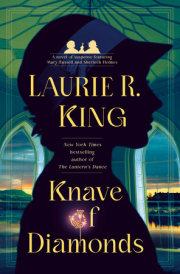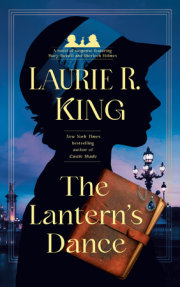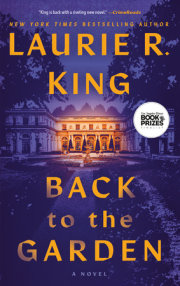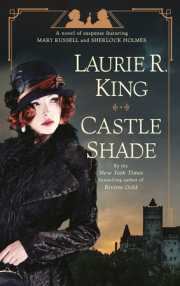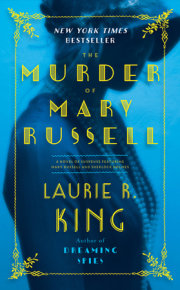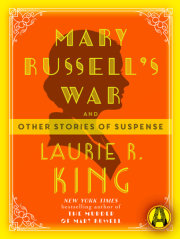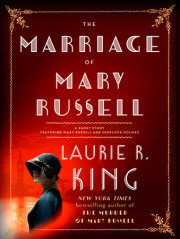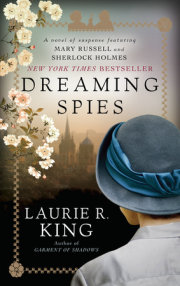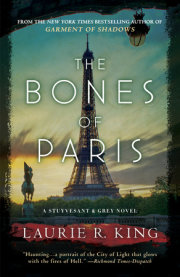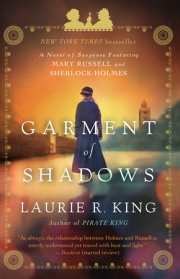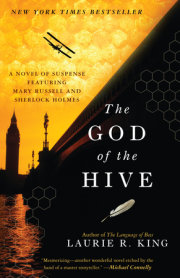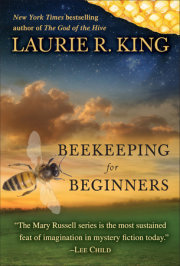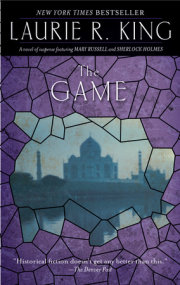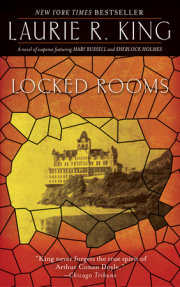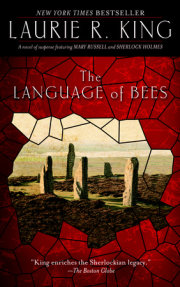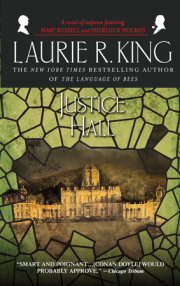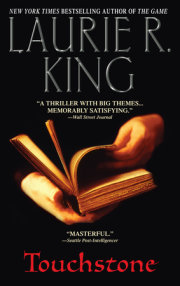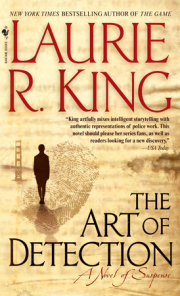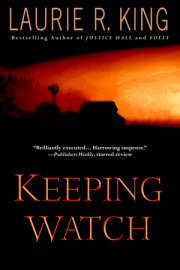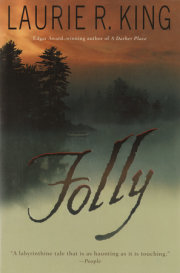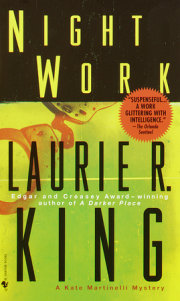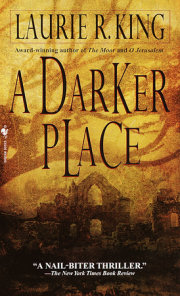One
dian
From a distance, there was nothing on the hillside, nothing but the dry grasses of late summer and a smattering of scrub bushes beneath the skeleton of a long-dead tree. From a distance, no unaided human eye could have picked out the dun and dusty figures from the grass around them; nonetheless, they were there, one long, slim human and two massive dogs. They had been on the hillside since morning, and they moved little.
Their presence had not gone completely undetected. An hour earlier a small herd of white-tailed deer quartering the hillside had abruptly cut short its graze to veer nervously away. Twice, sentinel quail settling into the arms of the twisted stump had alerted their flock to direct their attentions elsewhere. And now a turkey vulture appeared above the far side of the valley, gliding in languid circles on the updraft that rose off twenty acres of crumbling asphalt and debris, the remains of an office complex from Before. The bird spotted the three prone figures and sifted the wind through the distinctive fingers of her pinions, sidling across the currents to take a position a hundred feet above the invisible figures. Hopeful thoughts flickered through her tiny brain and she dropped lower, then lower still, until one of the bodies jerked about to gnaw its flank, and another, the long one, turned its face to the sky and waved an arm. Faint avian disappointment came and went at these unmistakable signs of life, and the bird slid sideways toward the next valley. The three figures resumed their motionless watch.
Now, however, their stillness was one of alertness, even tension, rather than mere waiting. The human, no longer completely covered by the diminishing shadow of the grease bush, stared intently through a pair of large and ancient Artifact binoculars at the hillside ten miles away, where a faint haze of dust teased up from the ridge. In a few minutes the haze solidified into a cloud, its source coming clear: travelers. Eyes--blue human, yellow canine--focused on the spot, watching the drift of dust move down the face of the hill, saw the half-obscured wagons pause to weigh the temptation of the direct route through the Remnant against the unknown threats it could hide, saw the travelers turn to circle well clear of the tumbled remains. When the wagons had safely negotiated the dry streambed and regained the road, when it became clear that the travelers were firmly committed to the left-hand fork, the binoculars went into their case, the weapons were gathered up, and woman and dogs slithered over the top of the hill and disappeared.
judith
Two hours later, near the place where the road's left fork dwindled to its end, another woman watched for another small cloud of dust to rise against a backdrop of trees, chewing her lip with impatience. Her name was Judith, and she sat perched on the top step of a sprawling old farmhouse that had once been painted white, shelling dried beans. Her bare toes were drawn back from the hot edge of the sun on the next step down; the worn boards and pathway below were thick with beans that had missed the bowl under the sharp, irritable jerks of her work-hardened fingers.
Judith didn't even see the waste she was making. Her eyes were on the Valley entrance, her inner gaze fixed on that vision of the morning's frantic activity--no, call it what it was: panic, mindless and dangerous, that had gone on far, far too long. Bringing the Valley into line had been like pushing a laden cart uphill, and Judith ached with the strain. But at last the long-unused emergency drills were recalled, and order jerkily took hold, and finally the gears meshed and things ran smoothly: guards out, weapons ready, all metaphorical hatches securely battened.
Now there was nothing left to do but wait. Forty minutes earlier she had found herself standing alone on the veranda, wishing she had gone with Dian, wondering if she shouldn't take a position at the Gates with a rifle, half-yearning for a return of the morning's upheaval just so she'd have something to keep her occupied--until she heard what she was thinking and berated herself: For God's sake, you're a lousy shot, Dian's better off without you, and you should be grateful things finally calmed down. Go find something to do!
So she'd found a mindless task and settled to it--badly, with shameful waste--and waited for Dian.
The worst part was the silence. She felt smothered under it, this strange, thick stillness where there was usually the workaday noise of an active community--children shouting and adult voices raised in work and song, the rumble and thump of the mill machinery, the echo of hammer and the rasp of saw and the jingle of harnessed horses pulling plow or cart. The myriad sounds that made up the daily voice of the Valley were gone, the core of its life locked up and guarded in the hillside caves high above the farmhouse. The oddly muted sounds of cow and goat drifted down from the upper pastures; the cock crowed in protest from the enclosed run behind the barn. Even the imperturbable blue jay that haunted the walnut tree seemed flustered at the impact his raucous voice made on the still air and flew off into the redwoods. Judith listened to the few voices of low speech, the crackle and patter of the beans dropping into the basket, the breath soughing in and out through her nose: no competition for the pervasive quiet. The hot air shivered with silence, and Judith watched the Gates.
Not actual gates, of course, not like Meijing had--there was no way to wall the area against determined invaders, although God knew they'd talked about it, especially, Judith gathered, during the early years. But the Valley was peculiarly well suited for defense, the hills at its back steep and heavily wooded, the low ground in front marshy where the creek spread out between a pair of rocky prongs. And then, when the worst of the riots had been raging Outside, the community had responded to an unspoken urge to strengthen those prongs and built them higher and thicker until the Gates came into being. Nothing high explosives or a concerted effort wouldn't push aside, but a few armed women atop the structure would slow an enemy down.
As now it seemed to be slowing Dian, damn it. The minutes crawled, beans continued to fall into the bowl and across the steps, and then finally, a faint suggestion of dust rising into the air down toward the Valley entrance. A minute later, sounds reached through the utter silence: a woman's faraway voice--Dian's, she was sure, calling a salute to her unseen sentries. In a minute Judith could hear the clear thud of cantering hooves on the planks of the lower bridge; her eyes shifted to the dam, the pond behind it as unnaturally motionless as the air without its usual midday complement of splashing bodies, the mill frozen against the weight of the collected waters. After four long minutes Dian appeared around the side of the mill, her horse at a trot. The smaller dog, a two-year-old brindle that stood thirty-four inches at the shoulder, shot away from her side to galumph like a mad ox through the shallow edges of the mill pond, heaving up great sheets of water at each stride until it stopped, belly-deep, to lap furiously. The other dog, fawn-colored and bigger by three inches and forty pounds, remained at Dian's left stirrup until she turned her horse's head to the water. Then he, too, waded forward to drink. Judith watched him closely for an indication of Dian's feelings, and was relieved when he appeared relaxed enough to snap playfully at the water.
Dian only allowed her animals a small refreshment before pulling the horse back onto the road and whistling the dogs to her side. Judith heard hoofbeats again as Dian crossed the mill bridge; as if the sound had been a signal, the rider shifted in the saddle to peer up at the house, then threw up an arm in greeting.
Judith started to rise, only to exclaim in exasperation both at the basket, which nearly upended down the steps, and at the awkwardness caused by her expanding belly. She thrust the beans to one side and stepped into the full sun to respond with a wide wave. In another moment Dian disappeared behind the apple orchard. Judith continued down the steps, pausing to bend laboriously and gather a few stray beans, then abandoned the project to set off across the stunted lawn to the entrance of the farmyard proper.
Dian would reach her in two minutes, and Judith compromised with her impatience by standing at the gatepost in the shade of the old walnut, the farmyard's guardian since the first rough shack had been raised there by her great-great-grandparents. The five-bar gate itself was so choked with weeds and walnut sprouts that it would have taken a crew to force it shut, but as other gates now kept livestock from the crops, there was no need. She leaned her arms on the top of the fence, which like everything in the Valley needed paint, and breathed in the acrid odor of the thick, oily leaves. Over and around her hung thousands of smooth green nuts the size of a baby's fist, still tightly wrapped in their husks, a good month yet from harvest. Her own time would follow theirs, by two or three weeks. She smoothed her belly and pictured the soft, pale infant walnuts straining against their spongy husks, then her mouth twisted in irritation and she moved out into the hot road. Think about something else. Think about the travelers.
It was Dian, inevitably, who had seen the approaching wagons, at dawn. She had been out on one of her increasingly frequent and far-ranging overnight forays and had spotted them many miles away, and waited only long enough to be reasonably sure of their destination before riding hard for home. At nine o'clock that morning Judith had been down at the mill contemplating an obstinate piece of machinery when there was a stir of alarmed voices along the road. She stepped out of the mill house to see Dian clattering up the road on a horse white with lather and shockingly near foundering, Culum gamely at her heels and no sign of the two other dogs she'd set out with. The sweaty rider reined in the instant she saw Judith.
"What happened?" Judith was demanding before Dian's boots hit the ground.
Dian glanced at the curious faces turned their way, and called to one of the youngsters.
"Patty, would you do me a big favor, and take Simon here up to the barn? You know what to do with a hot horse?"
"Of course," the child said, with the perfect disdain of a ten-year-old, and took the reins. She had to pull with all her weight to get the exhausted animal moving again.
"Thank you, Pats. Okay, Culum, you can go home now." The huge dog seemed to nod his shaggy head at her as he passed, ambling off at a bone-weary plod. Dian turned to the other adults.
"I need to talk to Judith for a minute," she said apologetically, and they faded away with curious glances and concerned remarks. Dian waited until they were out of earshot, then turned urgently to Judith.
"Jude, there are people on the road. Two wagons and a bunch of riders, at least ten or twelve."
"Coming here?"
"Where else is there?"
"Couldn't they just be tinkers or traders or something?"
"Didn't look right, and tinkers would know not to ride through the hill road. Besides, they looked, I don't know, purposeful. Tightly bunched, but moving as fast as they could manage."
"Two wagons, though--what's the worry? We stop them outside the Gates and see what they want."
"Last year it only took one wagon, with some kind of gun inside, to wipe out the Smithy village," she reminded Judith grimly. Judith winced at the memory of dry blood and buzzing flies, and studied her sister's face.
"You're nervous about this. In fact, I could swear you look frightened. You're having one of your Feelings about those wagons, aren't you?" Judith's emphasis put a capital letter on the word, recognition that, every so often, Dian seemed to know things she couldn't.
"Yes, and no. They seem wrong, somehow. Not necessarily dangerous, just very wrong. I don't like the idea of them coming here with us all open like this." Her hand gesture took in the scene: the nearby field with its paused workers, the cluster of gaping children, the slim young man walking down the road.
Judith's eyes thoughtfully followed this last figure, her cousin Philip, before returning to Dian.
"You want me to call an alert," she said flatly.
"Yes."
"When we're all working from dawn to dark to get the crops in, you want me to declare a day off, so everyone can go play in the caves."
Dian heard the thread of capitulation hidden beneath the protest, and looked sideways at Judith, summoning a faint air of mischief.
"We'll have some nice babies in May," she suggested.
"It's no joking matter, damn it!" Judith exploded. "I can't go around calling alerts because someone feels nervous, even if it is you. This is serious."
Dian's attempt at humor faded.
"You can't honestly think I don't realize that?" she asked quietly.
"Oh, no, Di, I know you do. Sorry to be so touchy. The heat." Dian nodded. "It's a strong feeling, then?"
"It is."
"Strong enough to nearly kill a horse and abandon two dogs," Judith noted.
"They'll find their way home--Maggie bruised her foot--but, yes, that strong."
"There's going to be screaming about this."
"But you'll do it."
"Yes, damn it, I'll do it. We need a break anyway, and I suppose it'll do us good. When do you think they'll be here?"
"The road's bad and they've got two creeks to ford--if the wagons and riders stay together, they won't arrive until dark. If they abandon the wagons and ride hard, they could be here in four, five hours. I'll talk to Laine and Jeri, and if Carmen will trust me with another horse I'll go back and watch the road. I don't think we should wait too long to clear the place. At least get the menfolk out of the way."
Judith glanced nervously down toward the entrance to the Valley.
"You're sure about this?"
"No," Dian answered unhelpfully.
"Your hunches are usually right."
"Maybe this time I'll be wrong," she said, but her voice said she did not think it likely.
"All right, then, we'd better get on with it. What do you want me to do?"
Copyright © 2004 by Leigh Richards. All rights reserved. No part of this excerpt may be reproduced or reprinted without permission in writing from the publisher.


